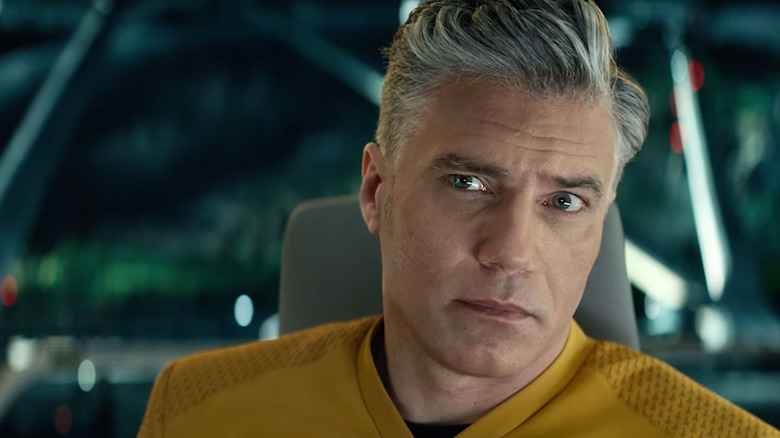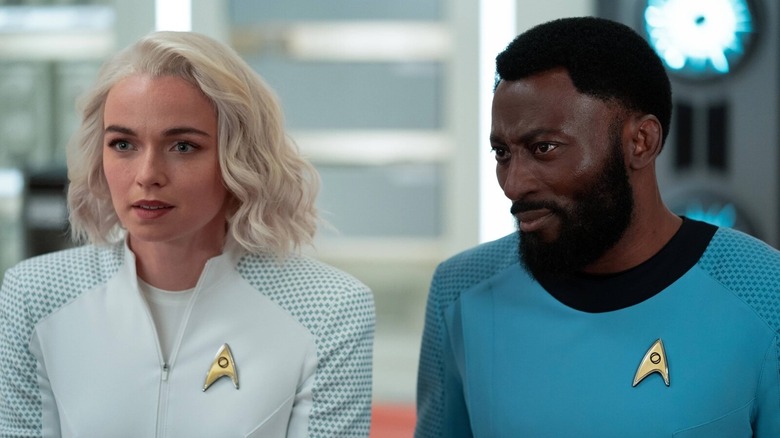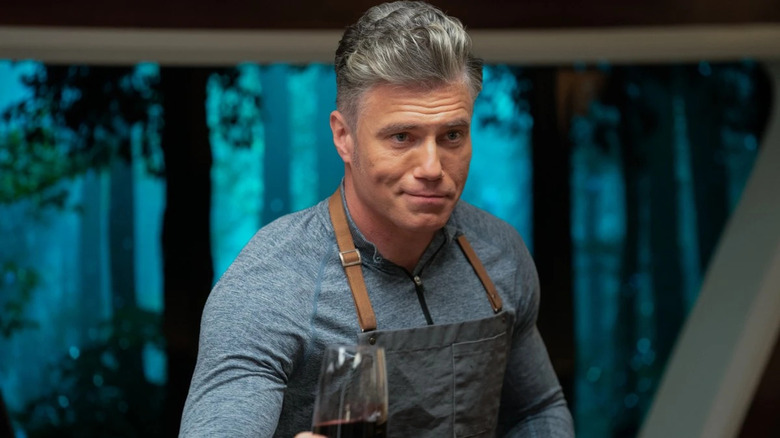Star Trek: Strange New Worlds Was Born Of Out The Misery Of 2020
One of those most critically touted features of "Star Trek" — one might say the defining feature — is its optimism. A lot has been made in "Trek" discourse about Gene Roddenberry's "vision," which pictured a future where humans were no longer beholden to money, to war, or to racism. In order to explore these issues, "Trek" put the offending words into the mouths of an alien species that Earthlings could then instruct. The 1960s series was often mawkish, and certainly still possessed elements of sexism — not to mention the occasional, weird admiration of fascism; Khan was a benevolent dictator — but its messages of a positive future remained pervasive. This is especially true of "Star Trek: The Next Generation," created after two decades of Roddenberrian rumination.
"Star Trek," then, can serve as a balm in dark times. When the future of our real world seems bleak — and it often seems exceedingly bleak — audiences can look to "Trek" for proof that things can turn out for the better. In the Paramount+ era, certain showrunners — particularly of "Star Trek: Discovery" and "Star Trek: Picard" — have tried to complicate those ideas by depicting the eternal, violent struggle of a very distant idealism. But as the world rounded 2020 — a pretty rotten year all around — "Star Trek: Strange New Worlds" entered development with a renewed vigor toward Roddenberrian upbeat idealism. More than before, "Trek" became about the joys of diplomacy, set in a future where things were finally peaceful and better again.
/Film recently sat down with Henry Alonso Myers, the co-showrunner of "Strange New Worlds," to talk about the show in general, and to speak about the challenges of pushing through the trials of 2020 to make something hopeful.
A weird, crazy challenge
To set the scene for his creative process, Myers explained where he was in 2020 — in the midst of the COVID-19 lockdowns — having to work from home, and spend a lot of time doing "research" with his family. "Research" was, for him, immersing himself in "Trek," watching old episodes and getting new ideas:
"I came onto the show in March of 2020, so it was right as the pandemic started, and it was a real weird, crazy challenge. I was working out of my garage, so when I say I would come home every day, that was me walking out of my garage through my backyard in my house. I'd come home every day and I'd just watch old Trek episodes with my kids, and it was an opportunity for me to kind of watch new and watch old stuff with them that they've never seen, and kind of watch it through their eyes."
It's addmirable that Myers was able to use his work as his emotional salve. Even though the challenges were constant, and the pandemic kept ordinary functions largely stymied, Myers admits that the show — and how excited he was to be working on it — got him through some tough times. Returning to older "Trek" time and again, he admitted, helped. He was especially fond of "Star Trek: Deep Space Nine," a show that often delves into heavy topics like genocide, the inevitability of war, and the difficulty of rebuilding a nation after occupying fascism.
If only people could see
Often, having a massive work project to work on can do more than simply keep one's mind occupied. In the case of Myers, it gave him genuine excitement about the future — a concept no doubt partially absorbed from the television he was taking in:
"I just remember thinking as we were going through that terrible, challenging year, and then the year that followed, they're like, 'Oh man, if only people could get to see the show that we're making.' I feel like it was a good place to be able to live, in a really challenging time. I'm really delighted that people are responding to it, because [co-showrunner Akiva Goldsman] and I, we love the optimism of 'Trek.' I mean, even in 'Deep Space Nine,' which is one of my favorite shows, there are moments of optimism about the Federation. Sometimes you need that."
Today, "Strange New Worlds" concludes its first 10-episode season, and the show has been thoroughly covered in the pages of /Film. Response has been incredibly positive, and the central character — Captain Pike, played by Anson Mount — is proving to be a stalwart, upbeat, relatable, and endlessly diplomatic captain. This is a gentler "Trek" than some of the shows of recent vintage, and audiences are definitely responding well.
Myers may have drawn optimism from the Federation of old "Trek," and we are drawing from his optimism in the new.


